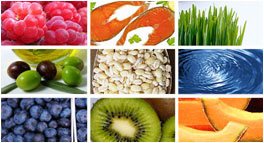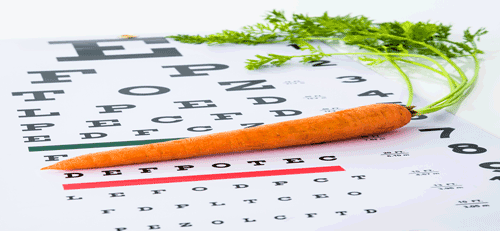Good Nutrition for Healthy Eyes

Research suggests that antioxidants reduce your risk of cataracts and macular degeneration. Specific antioxidants can have additional benefits as well; for example, vitamin A protects against blindness, and vitamin C may play a role in preventing or alleviating glaucoma. Essential fatty acids appear to help the eye in a variety of ways, from alleviating symptoms of dry eye syndrome to guarding against macular damage.
Eating healthily will also help protect your eyes. Try these foods to make sure you get enough eye-protecting nutrients:
Vitamin A: carrots, sweet potatoes, butternut squash.
Lutein and zeaxanthin: spinach, kale.
Vitamin C: sweet peppers (red or green), kale, strawberries,
broccoli, oranges, sweetmelon.
Bioflavonoids: citrus fruits, cherries, grapes, plums.
Vitamin E: sunflower seeds, almonds, hazelnuts.
Selenium: brazil nuts, yeast, seafood.
Zinc: oysters, wheat, nuts.
Fatty acids: Flax seed, cold-water fish (salmon, mackerel,
trout).
Antioxidants
More and more people are talking about antioxidants these days, and their probable role in reducing the risks of all sorts of diseases. Eye disease is no exception: research suggests that certain antioxidants can reduce the risk of cataracts, macular degeneration and more.
Vitamin A and Carotenoids: Antioxidants for Sight. Is carotenoid a fancy word for carrot? Not quite, but they are related. Carotenoids give carrots their orange color. You can find them in many red, yellow and orange fruits and vegetables, as well as in green, leafy vegetables (which are a great source of the carotenoid lutein).
Vitamin C and Bioflavonoids: May reduce your risk of glaucoma, cataracts and macular degeneration. Bioflavonoids help your body to absorb vitamin C and sometimes work as antioxidants themselves.
Vitamin E and Minerals: Nutrition from Nuts. Like vitamins A and C, vitamin E may reduce your risk of cataracts and macular degeneration. The minerals selenium and zinc help your body to absorb antioxidant vitamins and may have their own protective effects as well.
Essential Fatty Acids (EFAs) EFAs: Fat You Can Use. You're
getting too much fat in your diet ... and not enough: we consume
way too much omega-6 fatty acid and not nearly enough omega-3. These
fatty acids affect the eyes in a wide variety of ways.

Carrots are also a very good source of dietary fiber, vitamin C,
vitamin K, folate and manganese, and a good source of vitamin B6,
pantothenic acid, iron, potassium and copper. The orange-colored
taproot of the carrot contains a high concentration of beta-carotene.
Beta-carotene is a substance that is converted to vitamin A in the
human body. A 1/2 cup serving of cooked carrots contains four times
the recommended daily intake of vitamin A in the form of protective
beta-carotene.
A major Australian study called the Blue Mountains eye study, conducted in the late 1990s, examined the link between increased vitamin A intake and deteriorating night vision in older people. The authors found that people who reported having poor eyesight ate more carrots – just as their mothers had told them – to improve their eyesight. But it didn't help.
While there is some truth to the old wives' tale regarding carrots and eyesight, Professor Algis Vingrys, from the University of Melbourne's Department of Optometry and Vision Services, says no amount of carrots will improve your eyesight if you already have a well balanced diet.
A diet with sufficient vitamin A, iron and other provitamins (substances that our bodies can convert into vitamins) is vital for eye health.
There are two types of vitamin A: retinoids and carotenoids.
Retinoids are a lipid form of vitamin A found in liver, fish oils containing liver (eg cod-liver oil) and butter. Eating large amounts of these substances can give you an overdose of vitamin A and lead to toxicity, or worse, promote some forms of cancer.
Carotenoids are provitamins your body converts into vitamin A. Carrots, broccoli, sweet potatoes, pumpkin and dark-green leafy vegetables all contain beta-carotene, a potent carotenoid. But how much gets converted depends on how much vitamin A you already have in your body – in other words, your body doesn't make vitamin A if you don't need it.
A diet deficient in vitamin A can lead to night blindness and other eye problems. Reduced night vision is one of the earliest signs of vitamin A deficiency although people rarely complain of night blindness until it becomes really severe.
But vitamin A deficiency is rare in Australia. Most of us eat a reasonably balanced diet, although pregnant women, those who don't eat a varied nutritious diet and some people with bowel disease may need to see their doctor if they feel they are at risk.
Eating carrots (and other sources of vitamin A) can improve night vision if you are deficient in vitamin A, (you also need to be getting enough zinc and iron) but not if you already have a balanced diet.
The vision loss reported by the people in the Blue Mountains eye
study was caused by age-related deterioration not a dietary deficiency,
which is why their eyesight didn't improve regardless of how many
carrots they chomped on.
